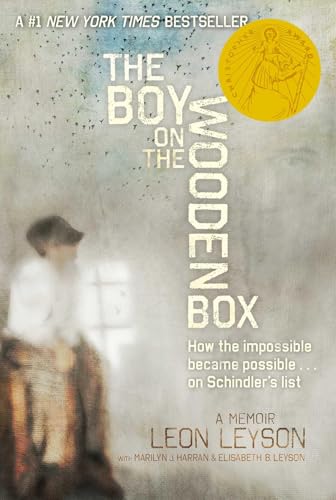The Boy on the Wooden Box
How the Impossible Became Possible . . . on Schindler's List (No Series)
Leon Leyson
BOOK REVIEW

The Boy on the Wooden Box: How the Impossible Became Possible . . . on Schindler's List is not merely a memoir; it's a heart-stopping journey into resilience and the indomitable spirit of a child who defied the odds. Leon Leyson, the author, brings to life the brutal realities of the Holocaust through the prism of his own experiences - a powerful testament to survival that will leave you breathless. 🌪
Leyson's narrative is woven with the raw threads of fear, hope, and ultimately, triumph. As one of the youngest workers on Oskar Schindler's factory list, Leon's story encapsulates the innocence of childhood overshadowed by the dark abyss of war. We traverse the harrowing landscapes of Nazi-occupied Europe, where Leyson vividly paints the chilling details of life in the Kraków ghetto and his family's desperate fight for survival. The juxtaposition of his youthful innocence against the backdrop of unimaginable horror creates a striking emotional dichotomy that compels the reader to confront the uncomfortable truths of history.
An extraordinary element of this memoir is the humanity within the inhumanity. Leyson's portrayal of Schindler is not that of a distant hero; rather, he presents him as a flawed yet profoundly courageous man who risked his life for the sake of others. Schindler's ability to save over a thousand Jews from certain death is an act of defiance against an oppressive regime. Leyson's admiration for Schindler imbues the narrative with a sense of hope, reminding us that even in the darkest of times, glimmers of kindness can pierce through the veil of despair.
However, The Boy on the Wooden Box excels in more than just historical recount. It digs deep into themes of identity, belonging, and the struggle to find one's place in a shattered world. Leyson's voice resonates profoundly as he reflects on the trauma that shapes his life long after the war is over. The joy of liberation is marred by the scars of loss, leading to profound reflections on the fragility of freedom. His insights challenge us to consider how we view history - not as a distant echo, but as a living, breathing narrative that shapes our modern identity.
Critics and readers alike have been moved by the authenticity of Leyson's writing. One reviewer likened it to a haunting melody, resonating with everyone who dares to listen. Others express it as a gut-wrenching exploration that "pulls at the heartstrings," forcing a confrontation with the moral complexities of human behavior during times of crisis. The narrative is not shy of controversial and uncomfortable truths, and this has sparked both admiration and debates among its audience-an essential discourse that perhaps echoes our modern struggles against intolerance.
Yet, while The Boy on the Wooden Box serves as a poignant reminder of the horrors of the past, it also evokes an urgent call to action. In a world still riddled with hatred and division, Leyson's life story compels us to stand against injustice, advocating for empathy and understanding over apathy. The memoir urges you to absorb history, not as a passive observer, but as an active participant in shaping a better future. 🌍
When you close the pages of Leyson's memoir, you'll be left not just with the weight of history, but with an invigorating urge to change the world around you. How do we honor the past? By ensuring it swells our hearts with compassion, pushing us to create a narrative driven by love rather than fear. As you embark on this emotional voyage, prepare for a transformation-one that will echo in your heart long after the final page is turned.
📖 The Boy on the Wooden Box: How the Impossible Became Possible . . . on Schindler's List (No Series)
✍ by Leon Leyson
🧾 256 pages
2015
#wooden #box #impossible #became #possible #schindlers #list #series #leon #leyson #LeonLeyson